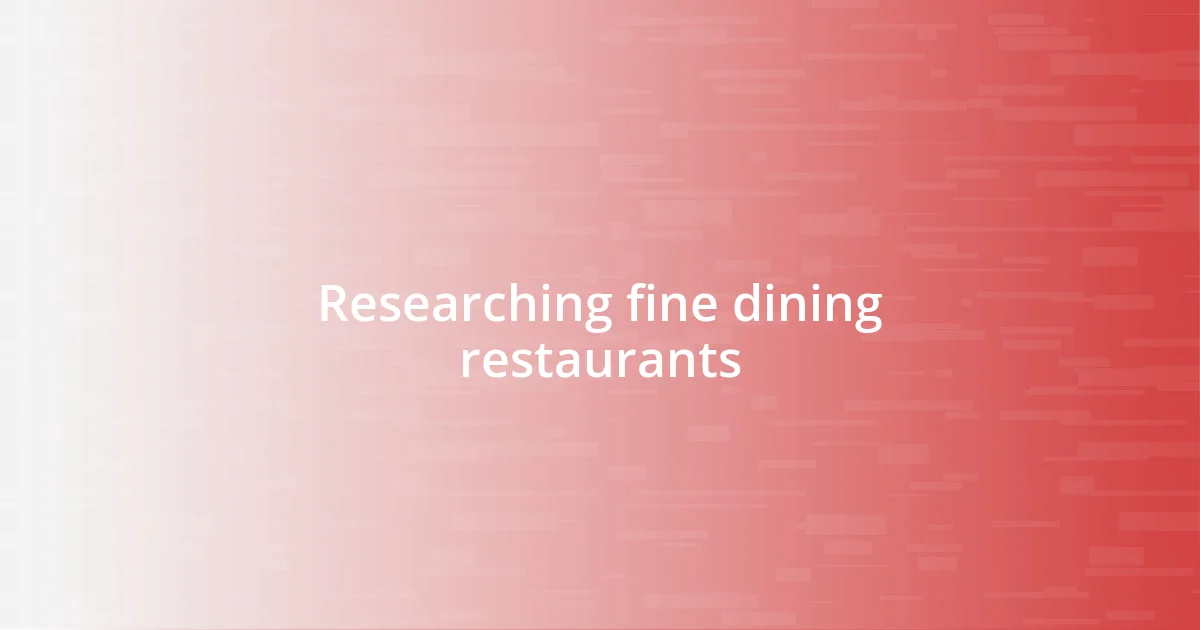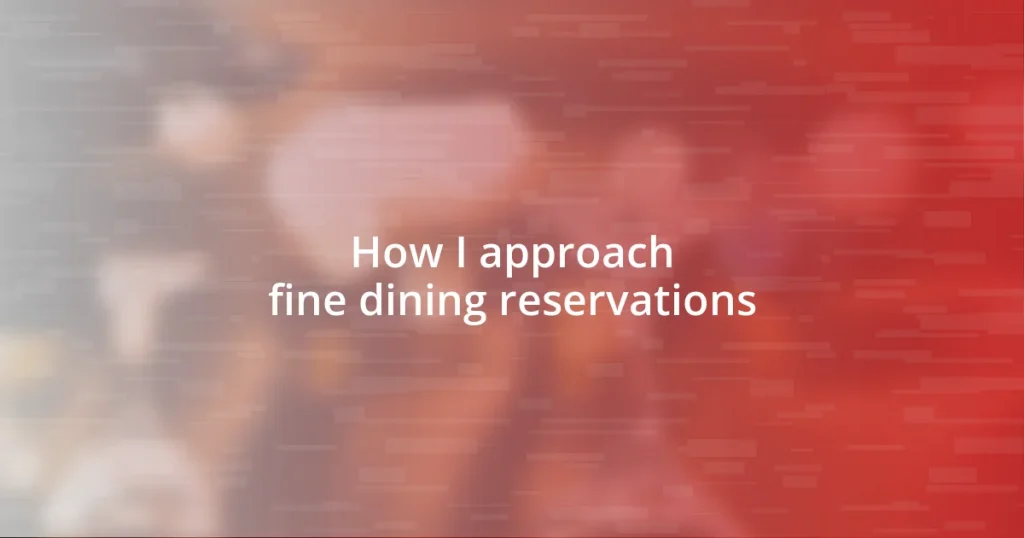Key takeaways:
- Fine dining is an immersive experience, highlighting the importance of atmosphere, service, and culinary artistry.
- Thorough research on cuisine, chef reputation, menu, ambience, and reservation policies enhances the fine dining experience.
- Effective communication of special requests and following up with the restaurant can lead to memorable and personalized dining experiences.

Understanding fine dining concepts
Fine dining isn’t just about food; it’s an entire experience. When I first dined in a Michelin-starred restaurant, I was struck by the beautifully curated atmosphere. The meticulous attention to detail—from the ambience to the plating—created a sense of occasion I hadn’t encountered before. Have you ever considered how the environment enhances the flavors of each bite?
Moreover, understanding fine dining concepts involves recognizing the significance of service. The first time I had a dedicated sommelier recommending pairings for each course, I felt like I was being treated like royalty. It made me realize that in fine dining, every interaction contributes to the overall experience. Isn’t it fascinating how a knowledgeable staff can elevate your meal from ordinary to extraordinary?
Finally, let’s not overlook the artistry behind the menu itself. I remember perusing a menu that read like poetry—not just listing dishes but telling a story. It made me appreciate the chef’s philosophy and passion. Have you ever felt the thrill of discovering a dish that resonates with your own tastes or memories? Fine dining invites us to engage with food on a deeper level, turning a meal into a meaningful journey.

Researching fine dining restaurants
When I start my journey into fine dining, the first step is always research. I often begin by exploring online platforms where food critics share their experiences. I find this invaluable; reading about others’ meals can uncover hidden gems or dissuade me from overrated places. I also enjoy checking out recent reviews on sites like Yelp or TripAdvisor, where patrons share not only their dining experience but also their thoughts on ambience and service. It’s like peeking behind the curtain before the main event.
To streamline my research, I focus on several key factors:
- Cuisine Type: I always consider what type of cuisine I’m craving—Japanese, French, Italian? Each offers a unique fine dining experience.
- Chef Reputation: I dive into the background of the chef. A Michelin-starred chef usually signifies high standards.
- Menu Highlights: I look for seasonal ingredients or signature dishes that excite my taste buds.
- Ambience: The restaurant’s atmosphere can greatly enhance the dining experience, so I often search for photos or virtual tours.
- Reservation Policies: Knowing if a restaurant accepts reservations or operates on a walk-in basis can shape my planning.
Ultimately, the more I know before stepping through the door, the richer the fine dining experience feels to me. It’s like preparing for an adventure, and I genuinely love the anticipation of discovering a new culinary treasure.

Timing your reservation
Timing is everything when it comes to fine dining reservations. I’ve learned through experience that booking a table at the right time can set the tone for the whole evening. For instance, I prefer to make reservations during off-peak hours, typically around 6:30 PM or 8:30 PM. This way, I avoid the bustling crowds and can enjoy a more intimate dining experience, where the staff has time to engage in conversation and make personalized recommendations.
Additionally, I’ve noticed that certain days of the week can lead to a more enjoyable experience. Weekdays, especially Tuesday to Thursday, tend to have a quieter atmosphere compared to busy weekends. One memorable Thursday, I dined at a newly opened restaurant. Thanks to a reservation made midweek, I enjoyed attentive service and even had the chance to chat with the chef, who was more than happy to share the inspiration behind their dishes. It was a delightful detail that wouldn’t have been as accessible on a packed Saturday night.
Lastly, I’ve come to realize that timing also extends beyond the reservation itself. When planning my dining adventures, I often consider special occasions or seasonal menus. I recall making a reservation during the restaurant’s lobster fest, which was a treat as the dish was featured at its peak freshness. By aligning my reservation with these special events, I enhance my overall dining experience, making it truly unforgettable.
| Reservation Timing | Benefits |
|---|---|
| Peak Hours (e.g., 7 PM – 9 PM) | Higher noise levels and crowded atmosphere, less personal attention |
| Off-Peak Hours (e.g., 6:30 PM or 8:30 PM) | More intimate experience, better service, opportunity for interaction with staff |
| Weekdays | Quieter atmosphere, easier to secure a table, enhanced attention |
| Special Events | Unique menu offerings, added excitement, better dish quality |

Navigating special requests
When it comes to navigating special requests at fine dining establishments, I find clarity is key. If I have any dietary restrictions or preferences, I make sure to communicate them clearly at the time of reservation. For instance, I once requested a gluten-free option for a friend’s birthday dinner, and the restaurant went above and beyond, crafting a delightful menu just for her. It’s these thoughtful touches that solidify my connection with the place and make the experience even more memorable.
I’ve also discovered that mentioning special occasions—like anniversaries or milestone celebrations—can lead to unexpected surprises. On one special night, I casually mentioned it was my partner’s birthday during the reservation call. When we arrived, the staff had prepared a small cake and an extra treat for our table. Those moments remind me how much a simple note can enhance the experience. It’s all about fostering that extra bit of warmth in a fine dining atmosphere.
Sometimes, the most meaningful experiences stem from a restaurant’s willingness to accommodate special requests. I vividly remember dining at a restaurant that allowed me to choose bespoke wine pairings. As I conversed with the sommelier about my personal preferences, it felt like a true collaboration. I believe that when restaurants openly embrace individual needs, they create a space where diners feel valued and understood, thus elevating the entire dining adventure. Have you ever had a moment at a restaurant where you felt truly special? Those experiences stick with us long after the meal has ended.

Making the reservation
When making a reservation, I often prefer to call the restaurant directly. There’s something about speaking to a real person that allows for a more personalized connection. During one of my calls to a fine dining spot, the host not only confirmed my table but also asked if it was for a special occasion. This simple inquiry opened up a conversation that led to a fantastic recommendation for a wine pairing I hadn’t considered. Have you ever felt that warmth from a voice on the other end of the line?
Another key aspect I find valuable is being flexible with dates and times. By doing so, I’ve discovered hidden gems during slower periods. Once, I decided to book a table on a rainy Wednesday. The atmosphere was enchanting, and it turned into one of the best experiences I’ve had, with attentive service and even a complimentary appetizer from the chef. It makes me think—how often do we overlook the beauty of spontaneity in our dining choices?
Lastly, I’ve learned that confirming the reservation a day or two in advance works wonders. It’s a small gesture that not only reassures me but also shows the restaurant I’m genuinely excited about my visit. I recall a time I called ahead only to find out the chef was running a unique tasting menu that wasn’t heavily advertised. That insider knowledge transformed my evening from standard to extraordinary! Have you ever taken that extra step and uncovered something delightful in the process?

Follow-up to enhance experience
After making a reservation, I always find it beneficial to follow up with the restaurant. I usually send a quick email confirming the details—date, time, and number of guests. It’s a small gesture, but it’s amazing how this can pave the way for a smoother dining experience. I once followed up with a place I was excited about visiting, only to receive a lovely response from the manager offering complimentary appetizers to celebrate my special occasion. Isn’t it wonderful how a simple follow-up can transform what might have been a routine meal into something extraordinary?
Moreover, if you’re celebrating something significant, don’t hesitate to reach out again closer to the date. I remember doing this for my anniversary dinner. I casually asked if any special arrangements could be made, and the restaurant surprised us with a beautifully arranged table and personal notes from the staff! This kind of attention to detail made us feel truly valued as guests. Have you ever elicited that kind of magic with a simple inquiry? I can assure you, it’s worth it.
Lastly, sharing feedback post-dining can be incredibly rewarding. I always take a moment to send a thank-you note or a review highlighting moments that stood out. On one occasion, I praised the waiter who provided exceptional service, and the restaurant actually shared my feedback with him. It not only enhances my connection with the establishment but also allows them to continue delivering amazing experiences. How gratifying is it to know that your words can uplift someone else? It fosters a sense of community that transcends just the meal.















